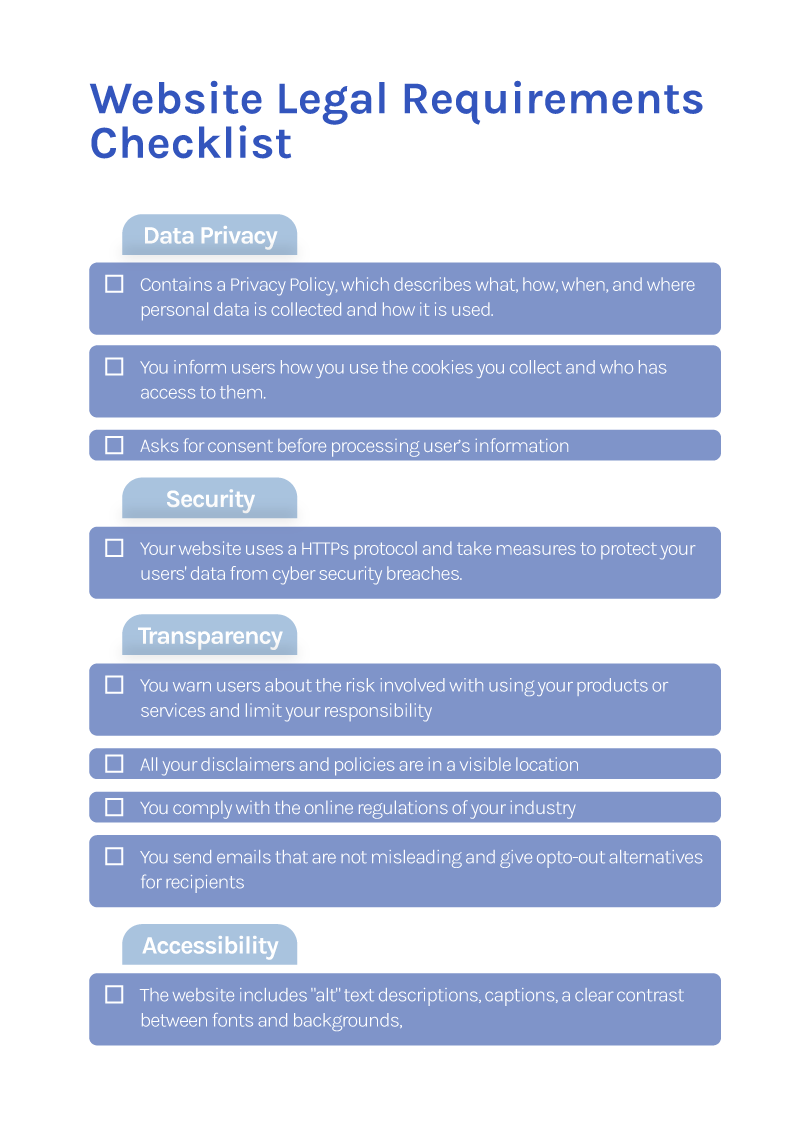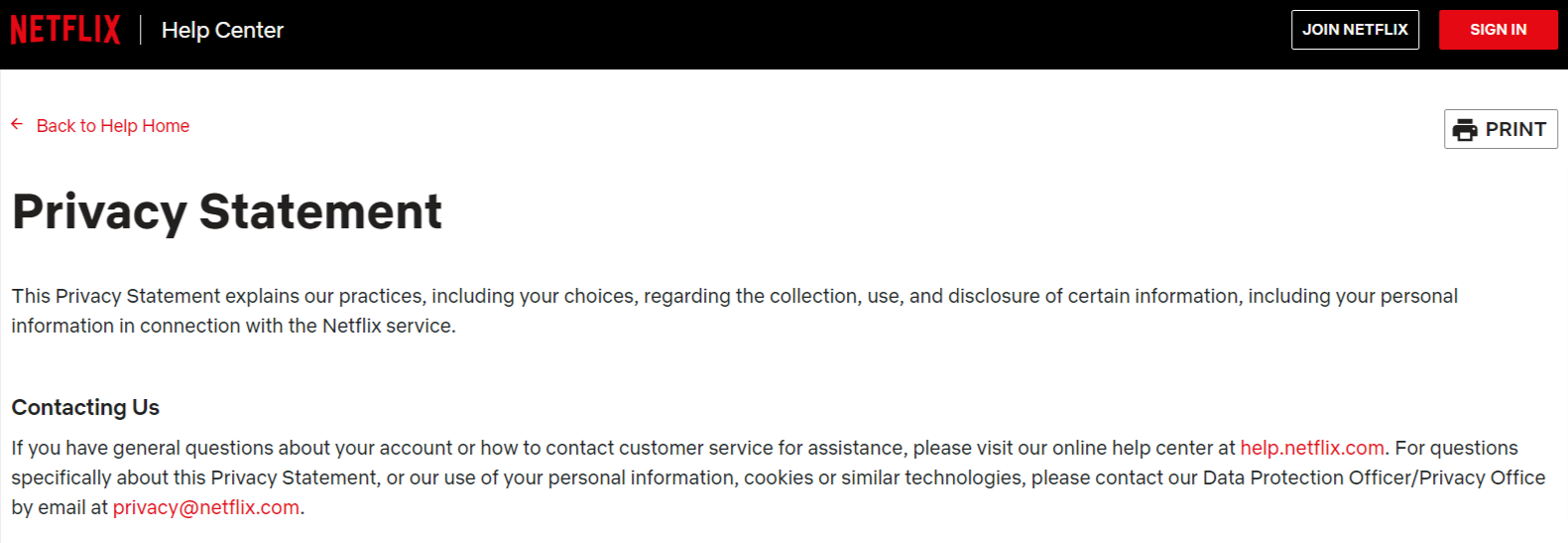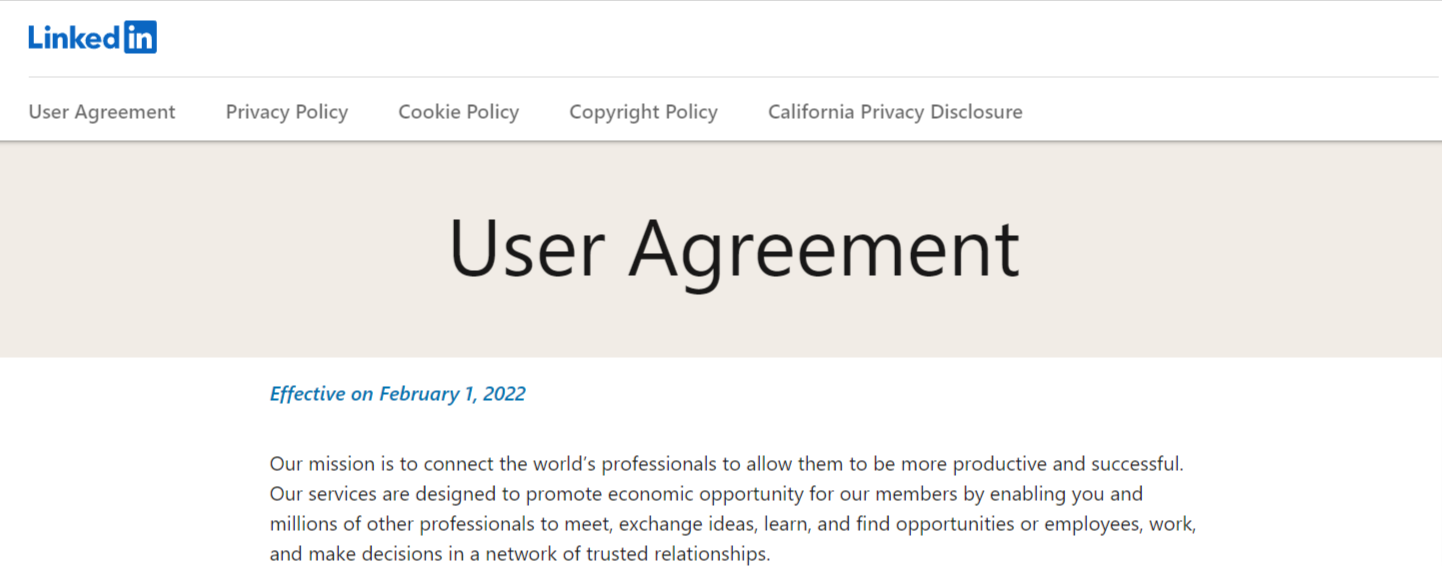As a business owner, a website is an essential tool that will help you increase the brand awareness of your company and reach more potential clients.
However, you must be aware that your website needs to comply with certain regulations according to the following factors:
- The purpose of your website: Is your website built for e-commerce, or is it just for informational purposes?
- Industry of your business: The kind of services you provide will call for different information. Depending on whether you are a doctor, lawyer, or accountant, you will have to add or avoid showcasing specific content on your website.
- Location of your users: The major concern is not where your business is located, but where your users come from. If you are expecting visitors from California, for example, you want to make sure to comply with the website laws of that state.
By adding this information to your website, you will decrease your legal risk, and increase the trust of your visitors through the transparency of your site.

1. Privacy Policy
A privacy policy is a document that outlines how you collect and use the visitors\’ information.
Also called a Privacy Agreement, it should contain the following:
- What data is collected
Such as
a) Names
b) Email addresses
c) Geographic location
d) IP addresses
e) What kind of cookies you use and who has access to them
f) Device
e) Third-party data
f) Credit card numbers
h) History
i) Browsing habits - Where information is collected from
Inform what websites, emails, apps, or online ads are capable of saving the visitors\’ personal information - What is the purpose of collecting such information
How will this information be used? Is it for advertising purposes? - How the information is collected
What cookies or other trackers you use - Who has access to this data
Disclose whether the information will be shared with third parties - The site’s contact details
Include your mailing address and phone number so users can get in touch with you and ask questions regarding their privacy rights - The rights of users over their data
Provide consumers with a way to opt out of the sale of their data and the data-tracking methods.
Privacy Laws are required under the General Data Privacy Regulation (GDPR) and the California Consumer Privacy Act(CCPA), which we will cover below.
You should display your privacy policy in a visible location on your website, which can be:
- Pop-up banner
- Footer
- Sign-up page
- Main menu

2. Cookie Consent
Your site must include a cookie policy and consent notice. A cookie is a piece of code that is downloaded on the device of a user and stores the past activity of the visitor. They are useful tools for advertising and analytics but may be an intrusion into your users\’ activity.
You must provide clear and comprehensive information on the way cookies work, the objective of using them, and what happens when visitors accept them.
For cookie compliance, you should notify people:
- There are existent cookies on the site
- Why your site uses cookies
- How much information about them is collected by websites
- You need their consent to store a cookie on their device, which involves the user ticking a box or clicking a link.
- How can users opt out or customize their cookie experience
- Any agreement with third-party providers
Cookie requirements and privacy policies can be combined into one document.

3. Terms and conditions
Also known as terms of service, it is a contract that determines the rules for using a product, service, or content on a website. It establishes the relationship between the provider of a service and its user and covers different topics such as:
Conditions of sale: E-commerce businesses should have a valid Terms of Service document, as required by consumer protection regulations.
This section should explain everything related to the methods of payment, shipping, delivery, refunds, and other policies.
Usage: Websites define what practices are allowed when benefitting from a service and what are the rights and responsibilities of users. Terms of service also dictate the actions to be performed in the event a user does not abide by the rules.
Image stock websites, such as Pexels, define the way their content can be used, how to credit authors, for what purposes the images can be used, etc.
Intellectual property protection: It’s key that a company defines policies to protect its intellectual property, and defines clauses that limit the distribution of trademarks. The terms and conditions declare that you own the logo, design, information, and any original content of your website.
Community standards: When the website involves user interaction, it is paramount that a website outlines what type of behavior is acceptable. These platforms usually ban forms of expression that show racism, sexism, violence, and other misconduct.
The terms and conditions will help reduce the liability of a business, prevent disputes, and protect its property.
Since this section has to address specific matters of the business, it is not recommended to use a template for this document, but to have a contract attorney that will tailor a Terms of Service Agreement that will cover the needs of the business.

4. GDPR
Your business should be compliant with the country you expect users from. For that reason, if you will offer goods or services to those located in the European Union, Iceland, Norway, Lichtenstein, Switzerland, or the UK, you should comply with the General Data Protection Regulation.
The GDPR sets stringent provisions that include anti-spam laws, cookie consent, data privacy, and collection measures.
Some of the actions that you have to take to comply with the GDPR are:
- Providing users with a way to give and withdraw consent to the collection and use of their data
- In the event of a data breach, notifying users of a data breach within 72 hours of becoming aware of it
- Informing users their data is being collected and providing them with an option to delete it
- Restricting the amount of information as only necessary, collecting it only for specific purposes and a justified length of time.
- Keeping the information secure from internal or external threats
Failing to fulfill these obligations can lead to hefty financial penalties.
5. CCPA and CalOppa
The state of California has its privacy laws, which include the California Consumer Privacy Act (CCPa) and the California Online Privacy Protection Act (CalOppa). If your website serves people in the United States, it should also comply with California laws, unless you block the traffic coming from this area.
CCPA
A CCPA-compliant website must inform the following:
- What personal data it collects, from where, and for what purposes
- The length of time it will retain the information
- Whether the information will be sold or shared
- What personal information do you disclose to third parties
- What privacy rights do consumers have regarding their personal information
- How to make a privacy request
Also, it addresses the age of consent for selling personal information. CCPA requires direct consent from minors between 13 and 16 years, but consent from their parents if they are below this age.
CalOppa
On the other hand, CalOppa treats matters concerning online privacy. This law exhorts websites to:
Inform what personally identifiable information the website collects and the categories of third parties with whom they may share this information
Describe the process for notifying consumers of any modifications to the privacy policy
These regulations are more strict and compel a website to protect all personally identifiable information through encryption and HTTPS.
6. Copyright
As a business owner, you should protect the intellectual property of your company with a copyright notice footer. The original content of a website is automatically copyrighted, even when you do not register it. With a written notice stating that your content is protected by copyright, others cannot use the text, images, videos, or music on your website without your authorization.
A valid copyright notice includes three elements:
- The copyright symbol ©, or the words “Copyright” or “Copr.”
- The year of publication of the website
- The name of the copyright owner
Besides protecting your intellectual property, you should be aware of not using someone else’s content inadequately. Remember to always use images or media that are free of royalties and that you can use for marketing purposes.

7. ADA
In addition to abiding with data privacy policies, your website should be accessible for people with impairments to comply with the Americans with Disabilities Act (ADA)
The purpose of the ADA is to provide equal access to information and end discrimination based on differing abilities. However, the legislature has not been clear about the guidelines websites should follow to be compliant. The best standard for online accessibility is based on the Web Content Accessibility Guidelines 2.1 (WCAG), which cover the recommended procedures of compliance.
How to comply with ADA
- Media files and maps should contain an “alt” tag
- Online forms should have descriptive HTML tags
- Videos should have an audio transcription
- The contrast ratio of the colors should be enough so all users can read text or see color differences
- Keyboard navigation throughout the site
Websites that have failed to comply with these standards have been subject to lawsuits, which has been the case of popular corporations, such as Barnes & Noble, Nike, and Netflix.
8. Disclaimers
A disclaimer is a notice in which a website alerts users of the risk involved with using its products or content. It can be a way of limiting the responsibility for the use of the website and the information it contains.
Disclaimers create transparency between the visitor and the website, as they set the expectations visitors should have regarding matters related to:
- Ad affiliation
- Testimonials
- Third-party services
- Warranties
- Copyrights
- Expressed opinions
- Limitation of liability
- Medica, legal, or financial advice
Although not all disclaimers are legally required, some, like affiliate disclaimers, are mandatory.
You can place your disclaimer in different locations, such as the legal policies, footer, banner, or at the end of an article.
9. HTTPS
To protect your visitors\’ safety, your website should employ HTTPS (Hyper-Text Transfer Protocol Secure), which is an authentication that encrypts transferred data.
This is of the utmost importance for e-commerce sites and websites that accept payments online, for it prevents the theft of information during the purchase.
10. Anti-spam Laws
The CAN-Spam Act sets the rules for commercial email and messages and gives recipients the right to stop advertisers from emailing, as well as the penalties for violations.
These laws do not only apply to bulk emails, but to any electronic mail message with advertisement purposes.
CAN-SPAM’s main requirements are:
- Not using misleading or false header information
- Do not use deceptive subject lines
- Identify the message as an ad
- Disclose the physical location of your business
- Tell recipients the opt-out options
Industry-specific legal requirements
Health Websites
For healthcare and medical websites to be compliant, they need to be aware of HIPAA’s Privacy and Security Rules. This includes companies in the biotech, life science, and pharmaceutical industry.
Healthcare regulations include:
- Websites must count on encryption mechanisms such as 256-bit AES algorithms to ensure the confidentiality and integrity of protected health information.
- Companies should notify patients whenever there has been a data breach
- Websites should inform users of the rights over their healthcare data
- Businesses should have strict access control with multi-factor authentication and automated logout
- A continuous administrative, technical, and physical maintenance of security measures to protect patient health information (PHI).
- Certify compliance by the business’s workforce
Attorney Websites
The American Bar Association regulates the information attorneys can post on their websites. These guidelines mention the following:
An attorney website cannot state they specialize in an area unless they hold their state court’s recognition of this.
- Lawyers cannot make promises about legal outcomes or imply that a client can expect outcomes similar to past consequences.
- Lawyers cannot make misrepresentations, such as claims that represent them as “the best”, or “the lowest prices in the state”.
- Attorneys need a disclaimer that states any content or interaction with the firm does not establish an attorney-client relationship. Also, the blog information does not constitute legal advice.
- Using stock images with models that could be confused with attorneys or media that does not reflect the firm.
Financial advisors
Since banking websites expose their users to the highest risk for their recurring business transactions, they are subject to more stringent security measures.
The Securities and Exchange Commission outlines a series of rules in which authentification processes and encryption are required for financial institutions.
Also, financial advisor websites should be more careful about the claims regarding potential results and using client testimonials.
Contractors
Some state regulations ask for general contractors to have their licensing credentials in a conspicuous location on their website. Not having the license ID could lead to a fine.
Complying with all these regulations will help you avoid lawsuits and terrible headaches. Always count on the advice of an experienced tech attorney that will ensure proper legal coverage in the event of a dispute.



